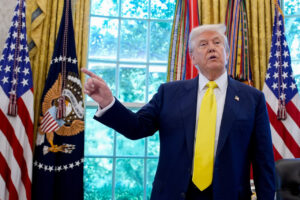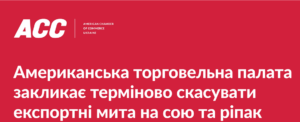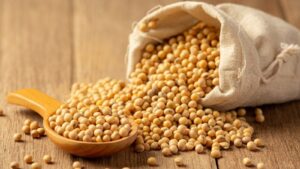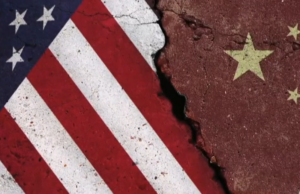
US President Donald Trump signed an executive order declaring a national state of emergency over the actions of the Cuban government, calling the situation an “unusual and extraordinary threat” to US national security and foreign policy.
According to the White House, the executive order also launches a procedure to impose additional duties on goods from countries that sell or otherwise supply oil to Cuba.
According to Reuters, the specific levels of tariffs and the list of countries in the document are not fixed – the decision involves further evaluation by specialized agencies of the United States.
Cuban authorities have publicly condemned Washington’s moves, saying that such measures could hit energy supplies and critical services on the island.

Rapeseed exports from Ukraine in October will not exceed 135-140 thousand tons, compared to 535 thousand tons last year (-73.8%). As of October 28, 125 thousand tons have already been exported, according to the analytical cooperative “Pusk,” created within the framework of the All-Ukrainian Agrarian Council (VAR).
“Exports are moving very slowly—everything is hampered by duties. It is they that have effectively stopped the normal work of exporters,” analysts noted.
At the same time, they noted that domestic processing volumes are growing.
“In September, we processed more than 100,000 tons of rapeseed, and in October, the figure will be no less. Against the backdrop of problems with sunflower, rapeseed is currently supporting the sector. Rapeseed prices in ports are quoted in the range of EUR 540-545/ton. At the same time, processors offer from UAH 25,000/ton and above,” analysts noted.
The European market is showing positive price dynamics.
“Over the past week, rapeseed exchange quotations have risen by EUR 10. January-February is traditionally expected to be the period of highest prices for this oilseed crop,” added Pusk.

International business, united by the American Chamber of Commerce in Ukraine, emphasizes the need to urgently cancel export duties on soybeans and rapeseed.
They were introduced on September 4, 2025 in accordance with the Law of Ukraine #4536-IX “On Amendments to the Tax Code of Ukraine and Other Legislative Acts of Ukraine in connection with the Adoption of the Law of Ukraine ”On Integrated Industrial Pollution Prevention and Control“ and in order to improve certain provisions of tax legislation” (Law #4536-IX).
The amendment on the introduction of export duties on soybeans and rapeseed was included in Law No. 4536-IX in violation of the principles of legislative technique, the Rules of Procedure of the Verkhovna Rada of Ukraine and the principle of stability of tax legislation. Such changes contradict Ukraine’s European integration course and Article 31 of the EU-Ukraine Association Agreement, worsen the investment climate, pose risks to the rule of law, and lead to losses for agricultural producers due to falling purchase prices and reduced acreage.
Since September 4, 2025, Ukrainian Black Sea ports have been blocked by ships and port railways by railcars carrying rapeseed and soybeans due to the unresolved procedure and criteria for applying the zero duty rate for agricultural producers. Thus, all exporters, including agricultural producers, cannot export their goods and suffer losses due to fines for demurrage of ships and other vehicles, excessive storage of grain in ports, extended insurance coverage, and failure to fulfill contracts with foreign buyers. Expensive goods are stuck in ports and are at risk from regular shelling of ports, as are the crews of foreign vessels whose customs clearance is blocked. Foreign exchange earnings (up to USD 2 billion) for rapeseed and soybean seeds in 2025 have been effectively disrupted. Currently, at least nine vessels are in such a standstill, and according to preliminary estimates, the estimated losses for the business will be between USD 5 and 10 million per month.
In view of the above and the current critical situation, the American Chamber of Commerce calls on the Government to
AMERICAN CHAMBER OF COMMERCE, DUTIES, RAPESEED, SOYBEANS, UKRAINE

Soybean exports from Ukraine in the 2025-2026 marketing year (MY, July-June) may decrease by more than a third and amount to about 2.7 million tons due to the expected reduction in crop production, the possible impact of export duties, and the continued attractiveness of processing, according to the information and analytical agency APK-Inform.
Experts recalled that Ukraine exported 3.97 million tons of soybeans during September-July 2024-2025 MY, which is 28% more than in the same period last year and set a new record for the season.
“The significant increase in export rates was achieved primarily thanks to the record harvest of this crop in the country in 2024, as well as attractive prices and geographical proximity to key global importers,” analysts explained.
At the same time, in their opinion, the record pace of soybean shipments in the summer may be stimulated by the expected introduction of a 10% duty on soybeans from September 2025, if the Ukrainian president signs the relevant bill.
Among the top buyers of Ukrainian soybeans in the current season, experts named Turkey (968,600 tons, up 39% from the previous season), Egypt (673,000 tons, down 31%), and the Netherlands (546,000 tons, up 2.7 times).
“In total, in the 2024/25 season, soybean exports from Ukraine could reach about 4.1-4.2 million tons (+26%), which could be a new record for the industry,” APK-Inform concluded.

China will impose additional duties on some imports from the United States, the Customs Duties Committee of the Chinese State Council said Tuesday. Tariffs of 15 percent will be imposed on chicken meat, wheat, corn and cotton, and 10 percent on sorghum, soybeans, pork, beef, aquatic products, fruits, vegetables and dairy products.
The move comes after the U.S. decided to impose additional 10% duties on goods imported from China starting March 4.
The unilateral imposition of tariffs by the United States undermines the multilateral trading system, increases the burden on U.S. enterprises and consumers, and damages the foundation of trade and economic cooperation between the two countries, the committee said in a statement quoted by Xinhua news agency.
China has also placed 15 U.S. companies on the export control list. They include Leidos, Gibbs&Cox, IP Video Market Info, Shield AI, Group W, General Atomics Aeronautical Systems and General Dynamics’ unit General Dynamics Land Systems.
Also included on the list of untrustworthy entities are 10 U.S. companies, which will prohibit them from engaging in China-related imports or exports and making new investments in the country. The names are TCOM, Stick Rudder Enterprises, Teledyne Brown Engineering (a unit of Teledyne Technologies), Huntington Ingalls Industries, S3 AeroDefense, Cubic Corp., TextOre, ACT1 Federal, Exovera and Planate Management Group. Last month, fashion brand owner PVH Corp. and biotech company Illumina Inc. made the list.

The Interdepartmental Commission on International Trade (ICIT) has imposed provisional anti-dumping duties on imports of radiators originating in Turkey and China in the amount of 41.86% and 42% respectively.
According to the ICIT’s announcement in the Uryadovy Courier newspaper on Friday, the decision comes into force five days after the date of publication of the announcement.
The announcement recalls that the anti-dumping investigation was initiated by the ICIT decision of 12 April 2024 based on the complaint of Ukrainian producers Sun Tech Paradise LLC and UTERM Ukraine LLC, whose share in the overall proceedings in Ukraine exceeds 50%.
The ICMT found that during the study period (January 1, 2023 – March 31, 2024), the financial and economic indicators of the national producer deteriorated, in particular, the volume of production – by 74.56%, production capacity – by 13.75%, capacity utilization – by 70.5%, and the volume of sales in the Ukrainian market – by 40.97%.
In addition, the financial result from the sale of goods deteriorated by 1606.24%, labor productivity by 59.47%, and the volume of investments in dollar terms by 78.69%.
The Commission also points out that in the first quarter of 2024, the volume of imports of radiators from Turkey and China increased by 157.13% compared to the same period in 2023 and by 21.9% compared to the first quarter of 2021.
The ICIT report also notes that the losses to the national producer from dumped imports of radiators from Turkey and China are confirmed by the fact that the volume of imports from these countries during the study period increased by 31.27% in terms of consumption of such goods in Ukraine and by 173.29% in terms of production.
The anti-dumping measures are applied to heating radiators (steel, aluminum, bimetallic) (excluding towel rails, water floor convectors and designer radiators) classified under UKT VED codes ex 7322 19 00 00, ex 7616 99 10 00, ex 7616 99 90 00.
San Tech Paradise LLC (Odesa region) manufactures plumbing products for heating, water supply, and sewage. According to its website, it has two factories in Ukraine (130 thousand square meters of production space) and produces 20 thousand tons of products per year. The company exports its products to Poland, Romania, Lithuania, Bulgaria, Georgia, and Mongolia, among others.
According to Opendatabot, in 2023, the company reduced its net profit by 40% compared to 2022, to UAH 61.2 million, while net revenue increased by 15.3% to UAH 552.2 million.
The company is owned by Andriy Kovalenko and Oleksandr Bozhko (50% each).
“UTERM Ukraine (Bila Tserkva, Kyiv region) has been operating in the steel panel radiator market since 2013.
According to Opendatabot, in 2023, the company earned UAH 6.7 million in net profit, compared to UAH 0.4 million a year earlier, with net revenue falling by 48.6% to UAH 124.3 million. The company is owned by four entrepreneurs with equal shares of 25% each.